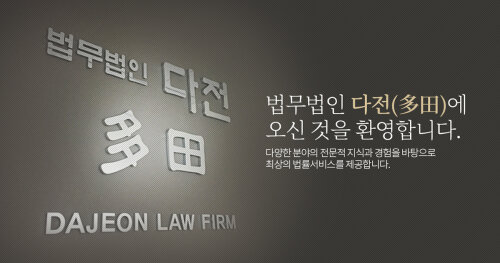Best Bankruptcy Lawyers in Seoul
Share your needs with us, get contacted by law firms.
Free. Takes 2 min.
List of the best lawyers in Seoul, South Korea
About Bankruptcy Law in Seoul, South Korea
Bankruptcy in Seoul, South Korea is governed by the Korean Bankruptcy Act, which outlines the procedures and regulations surrounding individuals and companies who are unable to meet their financial obligations. The main goal of bankruptcy law in South Korea is to provide a fair and orderly process for debtors and creditors to resolve financial issues and move forward.
Why You May Need a Lawyer
Individuals and businesses facing bankruptcy in Seoul, South Korea may require legal assistance for various reasons, including understanding their rights and options, navigating complex legal procedures, negotiating with creditors, and representing them in court. A lawyer with expertise in bankruptcy law can provide valuable guidance and support throughout the process.
Local Laws Overview
Some key aspects of bankruptcy law in Seoul, South Korea include the eligibility criteria for declaring bankruptcy, the different types of bankruptcy proceedings available, the role of the court-appointed trustee, the rights and responsibilities of debtors and creditors, and the consequences of bankruptcy on a person's financial future.
Frequently Asked Questions
1. What is the process of declaring bankruptcy in Seoul, South Korea?
In Seoul, South Korea, individuals or businesses can file for bankruptcy by submitting a petition to the court. The court will then appoint a trustee to oversee the bankruptcy proceedings and work with creditors to determine a repayment plan.
2. How will bankruptcy affect my credit score in Seoul, South Korea?
Declaring bankruptcy in Seoul, South Korea will have a negative impact on your credit score, making it difficult to obtain credit or loans in the future. However, with responsible financial management, it is possible to rebuild your credit over time.
3. Can I keep any of my assets if I file for bankruptcy in Seoul, South Korea?
Depending on the type of bankruptcy proceedings and the value of your assets, you may be able to retain some possessions, such as your primary residence or essential personal belongings. It is advisable to consult with a lawyer to understand your specific situation.
4. How long does the bankruptcy process take in Seoul, South Korea?
The duration of the bankruptcy process in Seoul, South Korea can vary depending on the complexity of the case and the cooperation of all parties involved. In general, it may take several months to several years to complete the process and receive a discharge of debts.
5. Can creditors continue to pursue me for repayment after declaring bankruptcy in Seoul, South Korea?
Once you have declared bankruptcy in Seoul, South Korea, creditors are required to stop all collection actions against you. However, certain debts, such as student loans or taxes, may not be discharged through bankruptcy and can still be pursued by creditors.
6. What are the different types of bankruptcy proceedings available in Seoul, South Korea?
In Seoul, South Korea, individuals can file for either liquidation bankruptcy or reorganization bankruptcy. Liquidation bankruptcy involves selling off assets to repay debts, while reorganization bankruptcy allows the debtor to create a repayment plan to satisfy creditors.
7. Can I file for bankruptcy in Seoul, South Korea if I am an expatriate or foreign national?
Foreign nationals and expatriates living in Seoul, South Korea are generally eligible to file for bankruptcy if they meet the residency requirements and have significant financial ties to the country. It is recommended to seek legal advice to determine your eligibility.
8. What are the consequences of bankruptcy on my personal and professional life in Seoul, South Korea?
Declaring bankruptcy in Seoul, South Korea may have various consequences, including restrictions on obtaining credit, potential impact on job opportunities, and social stigma. However, bankruptcy also offers a fresh start for individuals to rebuild their financial future.
9. Can I represent myself in bankruptcy court in Seoul, South Korea?
While it is possible to represent yourself in bankruptcy court in Seoul, South Korea, it is highly recommended to seek legal assistance from a qualified bankruptcy lawyer. An experienced attorney can provide valuable expertise and ensure your rights are protected throughout the process.
10. How can I find a bankruptcy lawyer in Seoul, South Korea?
You can find a bankruptcy lawyer in Seoul, South Korea by researching online legal directories, seeking recommendations from friends or family members, or contacting local bar associations for referrals. It is important to choose a lawyer with experience in bankruptcy law and a good reputation in the legal community.
Additional Resources
For additional resources and information on bankruptcy law in Seoul, South Korea, you can visit the Korea Insolvency Service website, contact the Korean Bar Association for legal referrals, or consult with financial advisors who specialize in debt management and bankruptcy solutions.
Next Steps
If you are considering filing for bankruptcy in Seoul, South Korea, or have questions about your rights and options, it is advisable to seek legal assistance from a reputable bankruptcy lawyer. An attorney can provide personalized advice based on your specific circumstances and guide you through the bankruptcy process to achieve a fresh financial start.
Lawzana helps you find the best lawyers and law firms in Seoul through a curated and pre-screened list of qualified legal professionals. Our platform offers rankings and detailed profiles of attorneys and law firms, allowing you to compare based on practice areas, including Bankruptcy, experience, and client feedback.
Each profile includes a description of the firm's areas of practice, client reviews, team members and partners, year of establishment, spoken languages, office locations, contact information, social media presence, and any published articles or resources. Most firms on our platform speak English and are experienced in both local and international legal matters.
Get a quote from top-rated law firms in Seoul, South Korea — quickly, securely, and without unnecessary hassle.
Disclaimer:
The information provided on this page is for general informational purposes only and does not constitute legal advice. While we strive to ensure the accuracy and relevance of the content, legal information may change over time, and interpretations of the law can vary. You should always consult with a qualified legal professional for advice specific to your situation.
We disclaim all liability for actions taken or not taken based on the content of this page. If you believe any information is incorrect or outdated, please contact us, and we will review and update it where appropriate.















